MercoPress. South Atlantic News Agency
Tag: Illex argentinus
-
Thursday, January 30th 2025 - 11:35 UTC
Argentina launches a month assessment of Illex squid along the Patagonian shelf
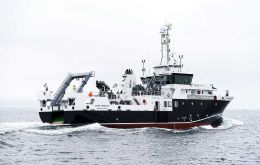
Argentina this week launched a month long cruise assessment of the sub-Patagonic squid, Illex Argentinus, on board the Ocean Fisheries Research Vessel, Victor Angelescu. The area of research will extend between parallels 46 and 51 degrees south.
-
Monday, June 24th 2024 - 18:02 UTC
Argentina prepared to end the Illex squid season for conservation reasons
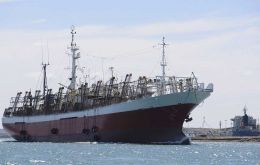
The squid industry in Argentina is surprised and expectant since the Federal Fisheries Council, CFP, (Act CFP 6/2024) has temporarily ordered all jiggers back to the harbors, given a report from INIDEP, in which the research center in Mar del Plata discovered a notorious lack of small, young squid, SS and S, in the area's biomass.
-
Wednesday, March 20th 2024 - 15:08 UTC
Good squid catch news from Argentina: jiggers managing some 30 tons per day
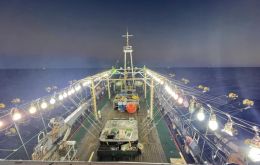
The Argentine current squid season, based on catches reports is considered encouraging because the so called sub-Patagonic, 46 degrees South, resource keeps the jigger fleet fully occupied with average catches of 30 tons per day, and with good sized specimens.
-
Thursday, December 21st 2023 - 10:54 UTC
Argentina launches South Atlantic operation targetting illegal fishing

Argentina's Joint Maritime Command has deployed the ARA Piedrabuena Oceanic Patrol Vessel (OPV) to combat illegal fishing through Operation Grifon XVI in the country's territorial Exclusive Economic Zone (EEZ) in the Atlantic amid an increase in clandestine operations by jiggers, most of them of Chinese origin.
-
Tuesday, April 2nd 2019 - 06:35 UTC
Argentina authorizes early opening of squid season north of parallel 44

Argentina's Federal Fisheries Council (CFP) decided to authorize the early opening of the northern squid sector, as it has been the case since 2016 on recommendations from the National Fisheries Research and Development Institute (INIDEP).
-
Tuesday, March 5th 2019 - 04:10 UTC
Argentina's seven-week Illex squid season has totaled 50.195 tons
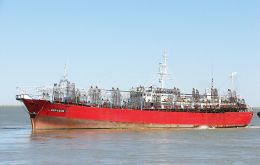
The 2019 squid season in Argentina took off with very good weekly yields, and average catches per vessel of 34.6 tons/day during the first seven weeks of operations south of the 44th parallel.
-
Friday, January 12th 2018 - 07:18 UTC
Falklands concern with vast fishing fleet gathering on high seas

A vast fleet of fishing vessels assembling to catch Illex squid on the high seas, some 400 miles north of the Falkland Islands, is an issue of concern to the Falkland Islands Fisheries Department.
-
Saturday, November 5th 2016 - 09:10 UTC
Why Falklands' conservation and management zone is so productive
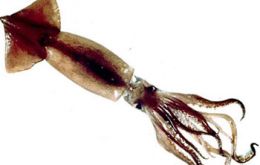
Three decades ago, on 29 October 1986 a Proclamation declaring the Interim Falklands Conservation and Management Zone was signed by then Governor Jewkes, which helped to transform the Islands economy. The anniversary has been marked by several events, and this week was the turn for a scientific approach on how and why the waters around the Falklands are so rich in marine life.
-
Tuesday, February 2nd 2016 - 07:47 UTC
Argentina fish landings down 4,2% last year, but squid was down 25%
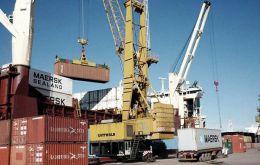
Fish landings in Argentina totaled 752,359.1 tons in 2015, which represents 4.2% less than the previous year, according to the latest from the National Under secretariat of Fisheries. Among the main species of commercial importance, Illex squid (Illex argentinus) led the decline with a drop of 25%, with landings amounting 126,531.4 tons until 30 December 2015.
-
Wednesday, September 23rd 2015 - 08:52 UTC
Argentine squid catch this season was down 23% to 127.217 tons

The squid season closed in Argentina with a total landing of 127,216.9 tons of Illex argentinus, representing an annual decline of 23% (38,005.6 tons), according to the latest stats published by the Under secretariat of Fisheries of the Nation. Last year the catch totaled 165.221 tons.
